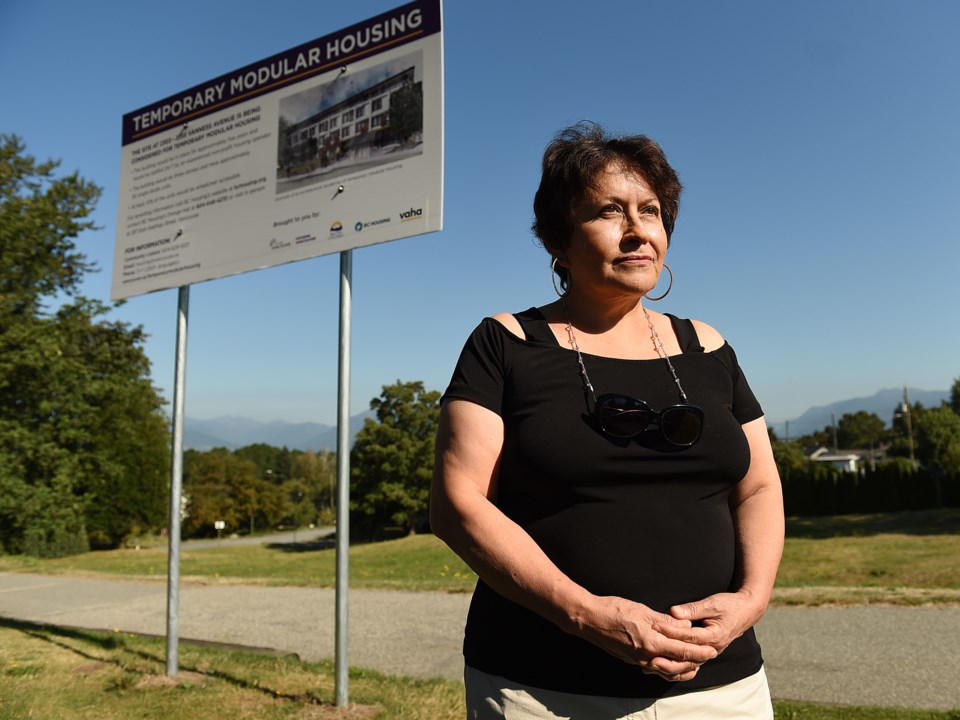Mayor Kennedy Stewart says he’s disappointed some residents near the Nanaimo SkyTrain station are pushing back against a city proposal to construct a temporary modular housing building for homeless people in the neighbourhood.
Stewart was referring to the public campaign launched by a group calling itself Neighbours Around the Nanaimo Station that is rallying against a proposed 50-unit building planned for a vacant city property at 2303-2355 Vanness Ave.
“I’m very, very disappointed in that attitude towards temporary modular housing,” said Stewart, who singled out the group’s leader Alicia Barsallo, a former provincial NDP candidate for Vancouver-Kingsway, in his comments.
“I know Ms. Barsallo claims to be a champion of working people and the poor in this city, and this is the exact opposite. I’m really, really disappointed in what she’s saying, and I hope she’ll change and support us.”
What Barsallo is saying is she and a group of her neighbours would prefer to see permanent social housing in their neighbourhood and have governments and developers pay for it.
“We’re not opposed to social housing that is quality and permanent, and that is good for multi-level income people – for singles, for families,” she said.
Barsallo described temporary modular housing as expensive, “substandard” and pointed out it will be torn down in five years, the duration of some of the leases on current modular sites in Vancouver.
The cost for 10 existing sites, which house 605 people, is $88 million.
All were funded by the provincial government, which said in March that more than 2,400 affordable permanent homes were also in various stages of the development process in Vancouver.
If approved and built, the Vanness building would cost $3.2 million, although that funding is expected to come from the federal government, which included the site in a recent funding announcement.
Barsallo said she worried homeless people living with addiction and mental health issues in the Downtown Eastside — who could conceivably become a tenant of the new building on Vanness Avenue — would not get the same attention in her neighbourhood.
“Those people are not going to benefit from temporary modular housing,” said Barsallo, who lives two blocks from the proposed site.
“More than anybody else, they need their community. And the one community we have that has been helping them and has been embracing them is in the Downtown Eastside.”
The proposal calls for 50 studio apartments for single occupancy in a three-storey building. All homes would be self-contained with a bathroom and kitchen. At least 10 per cent would be wheelchair accessible.
B.C. Housing, city housing staff, Vancouver Coastal Health and a non-profit operator will select the tenants for the building, which will include 24/7 on-site support services.
Stewart said the quickest way to triage homeless people is to get them into housing which, for the meantime, is available in modular form. He said he continues to press the provincial and federal governments for funding to build permanent housing.
Barsallo acknowledged the urgency to address the city’s homelessness crisis, but she likened temporary modular housing to a “Band-Aid” measure and a misguided initiative.
“We elected a council to do the pushback, to turn things around, to regulate developers and get affordable housing out of the big developments in this city,” she said. “Instead we’ve gotten a council that likes Band-Aids.”
The city’s communications department said in an email the site was chosen for a number of reasons, “all of which would allow the city and B.C. Housing to construct this urgently needed housing as quickly as possible and help people into housing.”
The site can easily connect to water, sewer and hydro and is close to public transit. The building would be in place for three to five years, with a possibility to extend another five years, the communications department said.
The city is expected to hold a second information session Sept. 16 on the proposal. The public can also send feedback to the city via email until Sept. 24.
Then it will be up to Gil Kelley, the city’s director of planning, to determine whether a development permit will be issued for the project.
Barsallo’s group, meanwhile, is holding a public meeting Sept. 20 at the Croatian Cultural Centre to discuss the project. Barsallo said city councillors Jean Swanson and Colleen Hardwick will attend.
“I expect a good attendance,” said Barsallo, who has signatures of more than 60 of her neighbours on an “open letter” to council that outline concerns about the project.
Barsallo’s concerns come as OneCity Coun. Christine Boyle is calling on council to explore allowing temporary modular housing in all Vancouver neighbourhoods.
If the Vanness project is built, it will be the 12th temporary modular housing site in Vancouver. The first one opened in February 2017 at Main and Terminal, where 40 people live and pay the $375 shelter rate.
@Howellings



